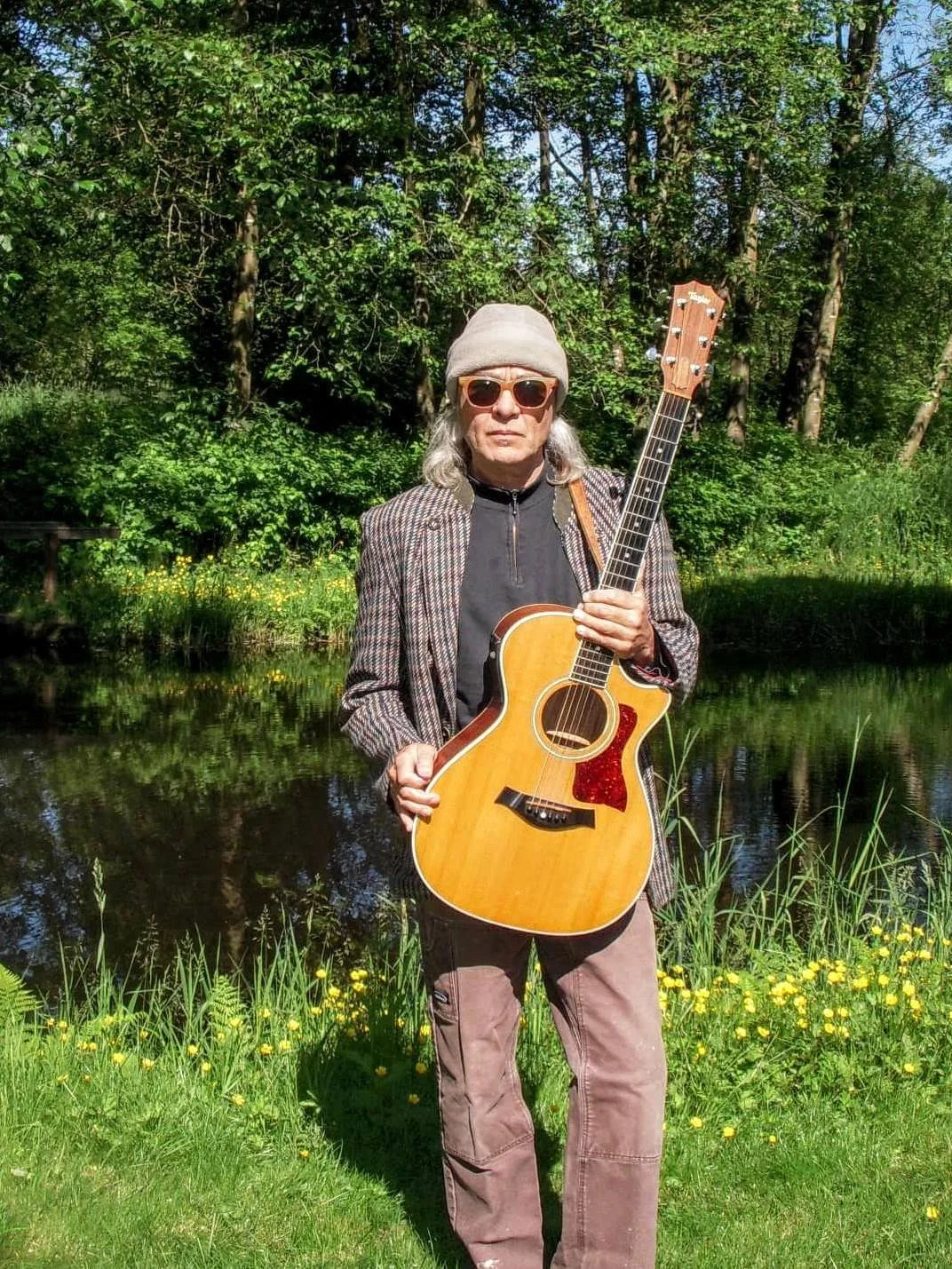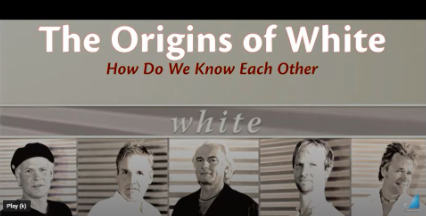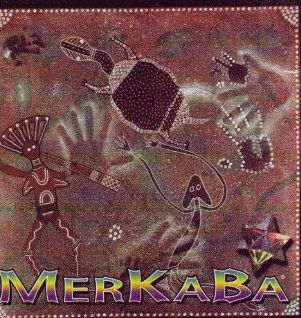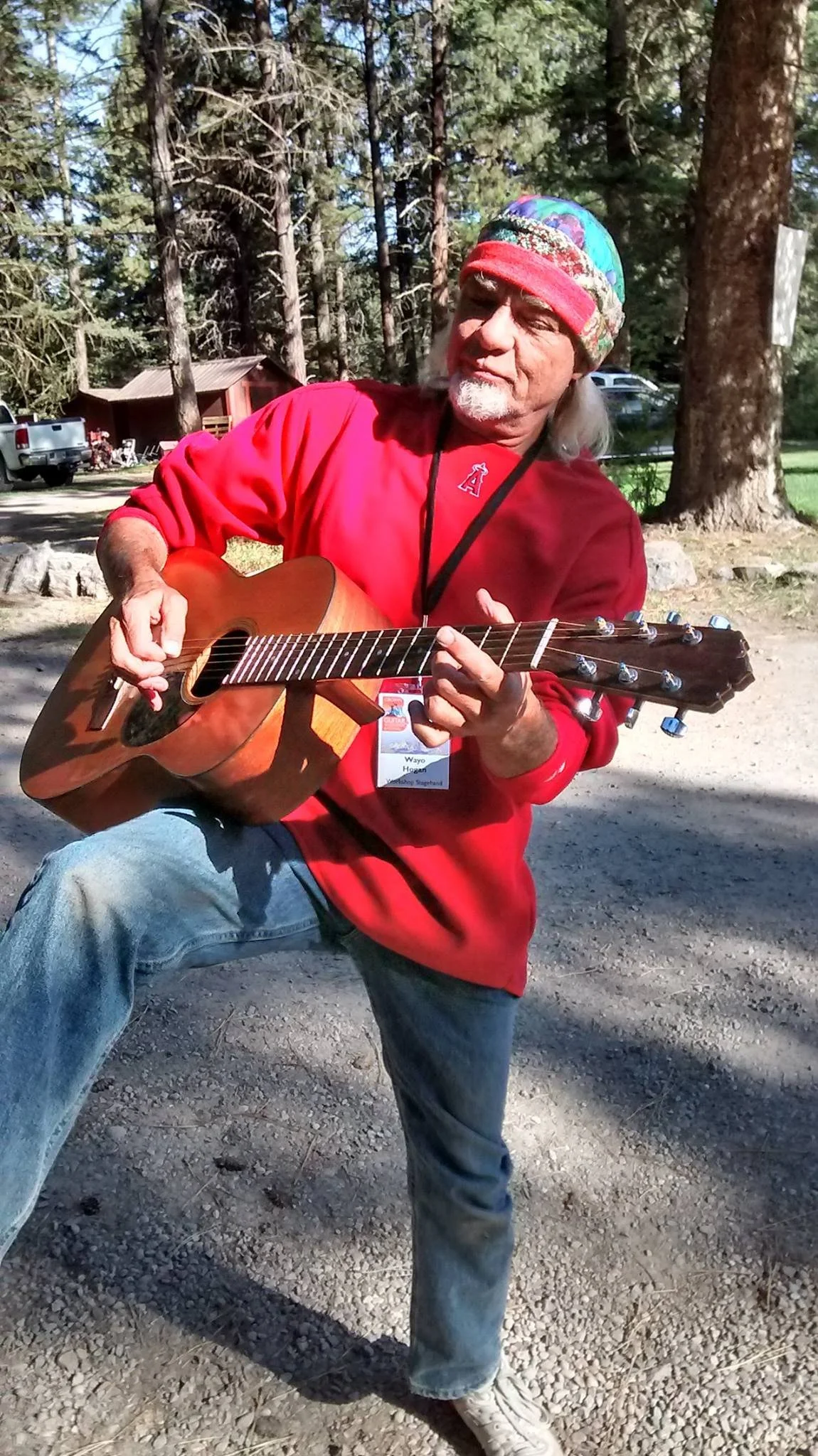The Lost Interview with White Salmon's Wayo Hogan
Wayo Hogan
By Jim Drake
A unique multi-media one-man music show called Playball Rag came to The Granada Theater in The Dalles on Saturday, Aug. 6.
I was pumped given Hogan’s fascinating career that spans 7 decades and includes collaborations with YES drummer Alan White as well as the late Joel Kabakov of the Columbia Gorge.
I had the chance several days back to interview Hogan.
Then, the universe took my notes, yet only to return them to me after his performance this weekend.
Regret? Sure.
Especially because Hogan is so fascinating. But isn’t this the nature of art, the nature of everything before us right now?
It’s the intangible that we so want to hold as it flitters away.
The beauty of live performances is that they are as unique and as individual as the thought and feelings of the person performing at that very moment.
So, the universe shall not wrestle this from us. These thoughts and determination will stand in this digital-electron ping pong. Here, now.
It’s a challenge to understand Hogan, a recent transplant to White Salmon… To understand what he’s done, been and accomplished.
So, I give you the Lost Interveiw With Wayo Hogan.
- Jim Drake
Richard “Wayo” Hogan, 72, an accomplished keyboardist, guitarist, and singer-songwriter is originally from the Seattle area. He says Playball Rag was created back in the 1980s from pairing his musical virtuosity with the lyrical ideas of his good friend Cooper Edens, a celebrated children’s book author.
Told in the style of a baseball game played in the imaginary afterlife by heroes like John F. Kennedy, Babe Ruth, Nicola Tesla and Malcolm X, Playball Rag “circles back and revisits some of the fo paux of the 20th Century.”
Performing since he was 14 years old, Hogan’s life and musical journey has taken him from the rockabilly swinging 1960s of England to a communal lifestyle in southern Oregon in the 1970s. He’s a pioneer of Seattle’s underground music scene. Hogan says “he was there” when bands like Nirvana and Soundgarden became Grunge Gods and put Seattle on the map as a source of new music culture.
He even has earlier stories of the Seattle music scene involving his friends that were in bands like Heart. And he will tell you that his music stories are true - and not to “believe what the media says is true.”
His musical resume includes a years-long friendship with one of classic rock’s most respected drummers, Alan White of the seminal rock band Yes. White played drums in Hogan’s underground world-rock outfit MerKaBa, and he fondly remembers a few gigs being on the bill opening for mainstream touring rock stars.
But it seems that Hogan’s non-musical work
experiences - in companies like Microsoft - resulted in his disdain and wariness of the corporate world. These themes come to light in Playball Rag, as Hogan will take listeners on a journey that he says will bring people an awareness of “the empowerment that is ready to occur, whether they want it to or not.”
Staying true to his “underground” roots for all of these years, it’s safe to say that Wayo Hogan is not a household name. But Hogan, now a recent transplant to The Gorge, may just start becoming one.
Our recent conversation begins to shed some light on Playball Rag, but it’s also a story of growing up, love, loss, and a human spirit that’s determined to leave a mark on the musical world and beyond.
Thanks for taking the time to talk about your music. There’s not a heck of a lot of information on the Internet about you, but I did see a reference that you worked with Alan White of Yes.
I’m old, and I’ve been around forever! And my last claim to fame was when I lived in Seattle was Alan White, who recently passed away, was my drummer. And here’s how his discography goes: John Lennon, George Harrison, Yes, and Wayo Hogan.
(I mention that I found out from an Amazon CD listing that White had guest drummed on one of his albums.)
Yes, Alan was a guest, and then he joined the band MerKaba, and we played with him and gigged around Seattle for a year or two. It was an underground band.
That band also had a didgeridoo player who lived with the natives in Australia. Her name was Allana Cini (a daughter of famous singer Al Martino [born Jasper Cini]. I married her.
I lived in England for a while, too, in the 60s, I played with a rockabilly band and believe it or not, these are true stories. This is my glom-on to stars because it’s not something I’m very comfortable doing! I mean, the fact that Alan White called me and wanted to be in my band is just ridiculous, isn’t it? But it’s really because “Underground” is really where it’s at. It’s not the media, it’s not the Corporations, it’s not the music industry. And that’s what I’m here to talk about. And that’s what Playball Rag is about.
Wayo Hogan
How have your past music and life experiences come into play for Playball Rag?
Because I’ve been really close to the heart - now this is the secret of Playball Rag - the Heart of the Corrupt Industry. And I’m not having it, I’m not giving a flying hoot about it!
When I was younger I worked and sold Microsoft products to Europe, so I’ve got a lot of answering to do, and I’m not proud of my accomplishments. I’m not really part and parcel to the grid as we know it, and the grid I’m speaking of is pretty much the Human Belief System.
A long, long time ago, when I was very young, I was in the Catholic Church. As a matter of fact, my father and mother were talking to the priest who later became the archbishop of the Diocese of Seattle. We were standing in front of a crucified person, and I’m sitting there looking at this thing, and I’m only like four years old, and these people are worshiping this, and I’m thinking, this is crazy. This is an insane world, I’m going to have to shut up, or else I won’t survive.
So you’ve seen where I’ve been, and now I’m so old that I can laugh so strongly at the idiocy that we’ve been through. And I need to try my best, before I take off for higher plains, my friend, to help people understand the power that they have, the empowerment that is ready to occur, whether they even want it to or not, at this point.
Mankind is actually having an awakening occurring, and it’s an awakening that’s far mightier than any we’ve ever known about. And it will happen so quickly, in the next few years, and I’m so far ahead of this curve. That’s what Playball Rag is indicating.
And I’m not pulling punches! Playball Rag features these people I make fun of: the Rothchilds, the Rockefellers, the Gates family and JP Morgan. I grew up with Bill Gates, I know this is corrupt, I’m not guessing and this is not some kind of analysis, I know what’s going on!
I’m really old, (laughs) and believe me, this earth we’re in is a magic ball, and we look at it as the reality and we’re thinking this is real. But these plastic shacks that we build (pale in comparison to) the true way of building that was before us. In the days before, the wonderful architecture that we have no explanation of where it came from. We have a great explanation for it but we don’t have any explanation of how we did it. We have a great history of where it came from but we don’t know how they did it. We can’t do that now and we say it’s because of money! Well if it’s because of money, what the heck, how can money be the determining factor in something like that?
I look at a lot of things and they don’t add up, so that’s why I finally realized I had to put the Playball Rag out before I leave. And I’ll make it a comedy, make it light, don’t need to get too heavy, you know, and I don’t wanna make fun of too many religious problems like we’ve got today in the world today. Because like I say, as humans, we really don’t need and have to believe anything. Our minds are our own. And they have been so, since the day we were born.
But, we were told what to think. At a certain point in my life, it got so overbearing, (laughs), to have to stand up under the stress of the critique of this world, I couldn’t do it. So rather than brave it through, I gave it up.
And I’m much happier and free, because I can do anything I want. And it’s all beautiful. I’ve got grandkids now, it’s wonderful, you know, it really is, and they’ll be there (at the show).
I’ve lived a strange life, and a lot of the people from the spiritual community that I’ve lived in back in Southern Oregon back in the early 70s, called Ascendington are still around, and people from my music stuff up in Seattle are still here.
I lived 10 years over in Montana and I was a house musician at the Flathead Lake Lodge. And that lodge is the place where everybody comes, the Bushes, the Clintons, and it’s where I finally got out of my West Coast hypnotic trance about what’s going on with our country.
I was exposed to some really incredible unbelievable information. But I take it all with a grain of salt, but I will have to say this, when I was playing there, the owner of Flathead Lake Lodge is a friend of mine, he’s a very humble guy for the power that he wields, and he came up to me one day and said why don’t you do your Playball Rag here at the lodge, Wayo, we would like that! And I said “Do you know what it’s about?” he said “No,” and I said “Well I’m making fun of all the bankers and all those people.”
So he gets his phone, and he shows me a picture on his phone, and says “You mean these people?” And it was a picture of the Rothchilds, and they had just been there the week before.
For years the Flathead Lake Lodge hosted a whole group of people called the International Fellowship, and I noticed every race and country was represented in this group of people. Finally, after about 3 years I finally went up to them and asked what are you about? They told me that they are the actual military of the planet, that they’re from every country, and we know who the enemy is and it isn’t who you think.
I don’t think this group can move forward and really reveal themselves to this world until we get out of our insanity, our hatred, our fear or our problems, which are absolutely self made.
But I don’t think we’re going to have the overview and the “overlording” of corporate monopoly for very much longer. I think we can all see that. That’s going to be a big crash. Those are the things I address in Playball Rag.
Tell us more about the players in this story.
In the first act Babe Ruth steps up, after we go through the beautiful little introduction, we are in Purgatory Park, an old baseball stadium, an afterlife baseball stadium, if you will, sitting outside the pearly gates of Heaven.
We see the players on the field, we know it’s a baseball diamond, and who are these players? Well, they are heroes from America’s past, they’re martyrs, JFK, MLK, Malcolm X, Geronimo, Nikola Tesla, and Babe Ruth gets off the mound after singing his welcoming song and begins his rant and the first thing he says is “come on, it’s time to be painfully honest my friends, this old ball game we’re playing is absolutely no fun at all.” His sense of fair play and innocence got corrupted a long time ago, it’s now being used against us, very effectively.
And he goes on from there and it gets worse and worse. And then Kennedy goes “Babe, now c’mon there big fella, relax, we’re in purgatory to enjoy our afterlife, it just seems in our suspended future we don’t have to deal with all that stuff, we’re free (laughs). We like to see ourselves being entertained by the world, safe, at home in our city among the stars.
So, you can see where I’m going with this, and, eventually, the old gas house gang gets together and they go down to Antarctica.
Antarctica? I actually did not see that coming.
Yes, there’s many levels of this and I’ve done a lot of research, and in Antarctica there’s something about to be shown to mankind but we don’t get to know it yet. But that’s where the ballgame is really being played, and every country has a little thing down there, but nobody owns Antarctica. I’m not talking about flat earth or anything like that, I’m just saying there’s some stuff going on we don’t know about and that’s where they go to play the ancient Milky Way Mudslingers - a peculiarly unfriendly ballclub known for hurling sizzling comets and wild baseball asteroids through the plates (laughs).
And it gets wackier and wilder and finally they do go down and they have the game and in the final act there’s kind of a surprise ending. It’s a major success story for everyone (laughs).
It sounds like ideas for Playball Rag have existed in your mind, in a song, or on paper for a number of years, and now it has finally evolved into something that’s ready to be presented?
Yes, that’s exactly right, and I’ll give you a little more history. I lived in Seattle, I don’t know if you know who Cooper Edens is, a very famous illustrator and author, who in the 80s had a book called “If You’re Afraid of the Dark, Remember the Night Rainbow,” and one called “Star Cleaner Reunion.”
We started writing musicals together, way back in the 80s. He wrote the words and I wrote the music for Playball Rag, and people from the production of “Cats” came up and said they wanted to buy the rights to it. But Cooper said, no, “Hogan and I are gonna do it.” But I said, “If you sell that we can do anything we want.” But he said, “No, this is our work.”
We didn’t get the chance to do the musical together, but it was great, and he is quite the lyricist, and it’s a real honor to be able to work on a collaboration with him.
I write a lot of songs on my own, but most of what I’ve done has been collaborating with Cooper, and we’ve been doing it since the mid-60s. Cooper Edens was involved in the Seattle music scene, and we started everything. We actually came up with the name for the band Heart. These are real facts, and people in Seattle argue about this stuff, because they’re so involved with fame and fortune, but we were there, we know what happened. It’s not like, oh yeah, we’re guessing what happened, we were there! We know what happened, we saw it. My friend Toby played in a band called Army, and their next name was Heart.
I’m done talking, I’m a gabberhoot!
I don’t mind!
It looks like you’ve been to The Gorge a couple of times in recent years for a few local gigs. How did you connect down here?
Oh, I’ll tell you - it was because I know Joel and Antonia Kabakov. Do you know them?
Yes, and I heard that, unfortunately, Joel passed away recently.
Yes, and I’m dedicating Playball Rag to both of them. And that was a heartbreak because I came down and lived with them for a couple of months before I found a place here in White Salmon, and I came down specifically because Joel and Cooper and I worked on Cooper Eden’s book The Starcleaner Reunion together.
And Joel is a part of that, he wrote one of the most beautiful piano pieces and he was such a maestro and such a great teacher. And Antonia plays the greatest castanets I’ve ever seen, it’s incredible. She was part of the Greco flamenco dance groups, no one knows this about her. In the 60s she was one of the most famous Flamenco dancers on the planet.
So Joel grabbed her up right after he graduated from Harvard. Joel was a friend of Leonard Bernstein, and Leonard said to Joel, “Listen, Joel, if you just do this (serial music composition), we can make you famous.”
But serial music composition to me is basically a mental exercise, it has nothing to do with music of the heart. And Joel said, “No thank you, I like to compose music.”
It’s the same thing with the Rock and Roll industry, all of those bands, Nirvana, Soundgarden, I love those guys, and we played with them the whole time and they were great. But when they got signed, and I hate to say this, it's sad for me because I know what I know, and I don’t want to be against anybody or for anybody - but they made deals that were worth more dead than alive.
Wayo Hogan then told a story about his band falling out when a record contract deal fell through.
My lead singer walked out because he wasn’t the songwriter and it was a big fiasco. They signed Nirvana that night because it was pretty obvious to them that Cooper Eden and Richard Hogan would never bow down for any kind of money, fame or any of that crap. I mean, who would blame those young bands, there’s a big chance in that stuff. I was directed there, I got all the way to the stage bringing them up there, and I was thinking great, I’ll do a record deal. But then when I found out what was really going on, I ran away to the hills. And I’ve been screaming bloody murder ever since and no one is listening. But now I get my chance with Playball Rag. Now I get to be out there and really Rag Around (laughs).
The Playball Rag flier says this will be a multi-media show.
So, for the show, I play an electronic keyboard that I split into the bass and classic piano sounds. One interesting thing about this show is I have help with images, I’m up there having fun with the songs and I have a live person who is my “Image Master.” There’s a screen behind me that works like clockwork, and it emphasizes everything I’m saying with visual images that are really hilarious or scary depending on where we are in the show, it’s very very interesting.
This play requires that I be spontaneous, I have to be heartful. I can’t just do what I’ve memorized, although it took forever to do that. Now that it is memorized I can go off from it and get back to it… occasionally, just for the fun of it.
What were your experiences with Alan White like?
It was such an honor to have a (MerKaBa) album of mine, have most of the tracks drummed by Alan. It’s an honor beyond compare. And to have his friendship, to have never, ever, not in one instant, with my relationship with him, ever go into his fame and fortune. He was my drummer, and that’s what he wanted me to know. And that’s all I cared about, and that’s who we were.
Unfortunately, because the business is what it is, there were people, scarecrows, hanging around, and they would take some of our music and record it and steal it, and we weren’t having that, but it was a sad thing that occurred.
It seemed that all of a sudden because of his generosity people were thinking “Oh, now we can rip this off,” and it was just sad. Then, to make matters worse, after 3 or 4 years together just playing, he was still with Yes, we were doing MerKaba and still recording and doing gigs when he could, my son passed away. And that just changed everything.
I just had to go, and at that point, I had to take care of my mother and father, both with 24-hour care. My son was gone and I just had to say goodbye to my MerKaba band with Alan White there, and I was poised, poised to do what though? To avoid taking care of my parents and my broken heart? No, I just went for it, I went to take care of my parents and drop the band and the band went on and continued to record my songs and became a band called White.
They would ask me to join them on stage once in a while and loved it. We got to open for The Cars, Peter Frampton, and Robin Trower, I mean all these great rock stars. I sat back in the Green Room and pretended I was a Rock star too! Well, they were playing my songs!
Alan was an amazing man, with a beautiful heart, he had been through the meat grinder of the business, all the way from England for God’s sake. He was best friends with Chris Squire (bass player for Yes), and when Chris died, it was hard for Alan because a drummer and bass player are a unit, and Alan started going down.
Steve Boyce, my engineer, producer and Alan’s best friend at that time tried to support him but he just couldn’t keep Alan from depression. And I was living in Montana, completely freaked out because everyone around me was dying, too. My mom, dad, son, roommate, my best friend….I think I scared everybody. I thought to myself that I had to get out of dodge before I died!
Now, I take really good care of myself physically. I juice and exercise. I’m 72 years old, I have to stay healthy for a few more years and get my work out there.




